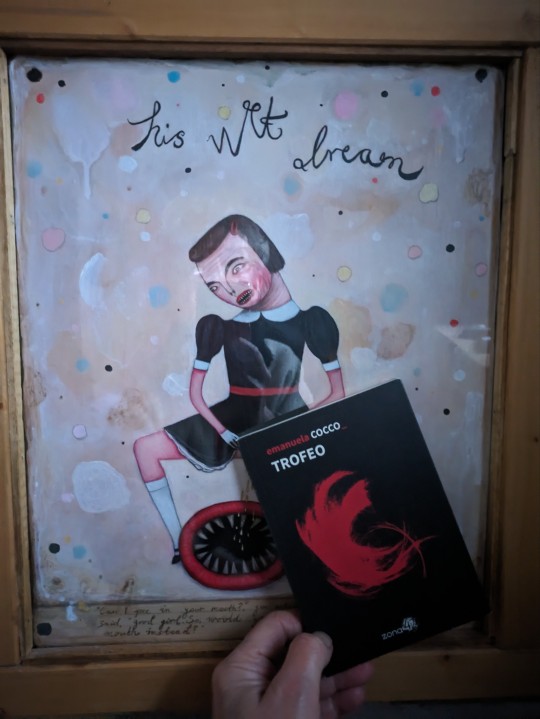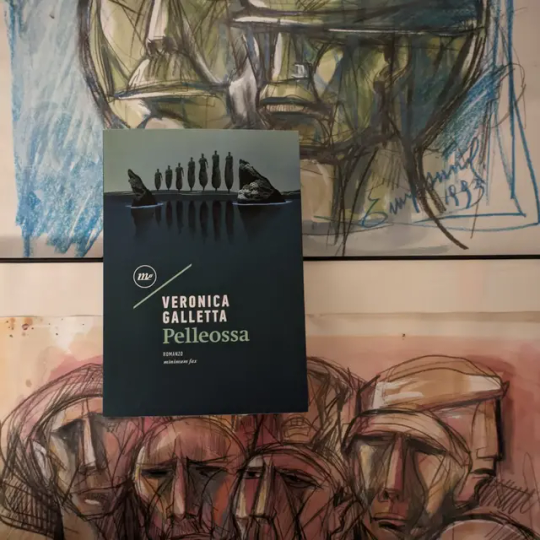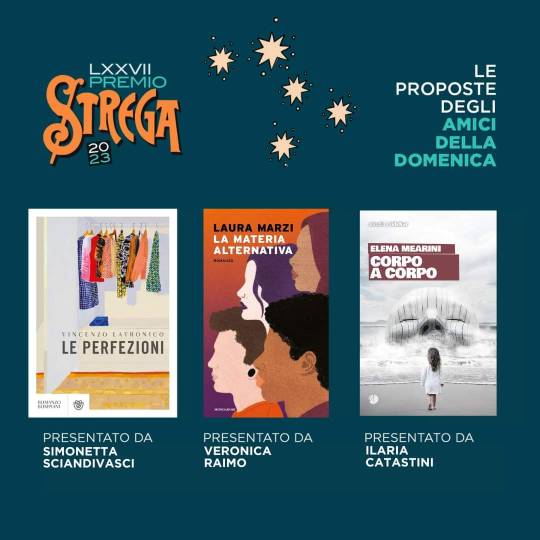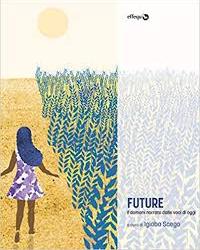#effequ
Explore tagged Tumblr posts
Text
“Memoria polaroid” – un blog alla radio S24E03
“Summer caught me by surprise”, cantano i Kikoto nella canzone che apre la scaletta di questa sera, e non è un caso cominciare da qui la prima puntata dell’autunno. Restiamo ancora per un attimo aggrappati a quella sorpresa ormai lontana e svanita, agli ultimi riflessi della stagione irrimediabilmente passata, con questa oretta di belle novità indiepop e indie rock, senza trascurare gli opportuni…

View On WordPress
#blog#Bologna#C86#compilation#download#effequ#Enzo Baruffaldi#Fcukers#feed#Hamilton Santià#indie#indie rock#indiepop#Kikoto#LCD Soundsystem#Love Will Say No#Luca Carnifull#mixtape#mp3#nastrone#NEU#NEU Radio#new releases#news#novità#nuove uscite#Nur#Persimmon#playlist#podcast
2 notes
·
View notes
Text
Perché diciamo no a PLPL, la fiera dell'ipocrisia
da redazione Chiara Valerio, meme. Ciao. Siamo le case editrici Armillaria, Capovolte, Edicola Ediciones, effequ, Liberaria, Moscabianca edizioni, Pidgin, Racconti edizioni, e questi sono i motivi per cui – in alcuni casi, come il nostro, già da tre anni – non partecipano alla più importante fiera libraria di Natale, quella che si proclama dedicata alla Piccola e media editoria. Una…
#italia#leggere#libri#politica#anarchia#Caffo#Chiara Valerio#editoria#Effequ#libro#Natale#Più libri più liberi#Pidgin#PLPL#romanzo#society#violenza
0 notes
Text
[Mostro][Liv Ferracchiati][Ehsan Merhbakhsh]
Un libro ideale per stimolare la curiosità e la creatività dei più piccoli. Con "Mostro", i bambini di ogni età impareranno a giocare con le parole e a scoprire il piacere della lettura.
Cosa nasconde la parola “mostro”? Un viaggio nel significato e nella fantasia! Titolo: MostroScritto da: Liv FerracchiatiIllustrato da: Ehsan MerhbakhshEdito da: effequAnno: 2024Pagine: 16ISBN: 9791281639027 La sinossi di Mostro di Liv Ferracchiati e Ehsan Merhbakhsh “Di cosa è fatto il mostro, come lo riconosco?Può essere bello essere un mostro, cosa voglio dire quando sto chiamando così…
#2024#Effequ#Ehsan Merhbakhsh#fiction#gay#Italia#LGBT#LGBTQ#libri gay#Liv Ferracchiati#Mostro#nonfiction#Saggi#Scatoline#Vera Gheno
0 notes
Text




3 writers for 3 painters
Emanuela Cocco/Mia Makila - Beatrice Galluzzi/Angelo Barile - Veronica Galletta/Ermes Simili
#lowbrowart#lowbrowillustration#lowbrowpopsurrealists#mia makila#angelo barile#books#weird books#ermes simili#emanuela cocco#beatrice galluzzi#veronica galletta#minimum fax#effequ#zona42
1 note
·
View note
Text
✨Ecco il quinto gruppo dei titoli proposti dagli Amici della domenica per la LXXVII edizione del Premio Strega:
▪ Piero Balzoni, «Vita degli anfibi» (Alter Ego), presentato da Paolo Di Paolo.
▪ Maura Chiulli, «Ho amato anche la terra» (Hacca), presentato da Raffaele Nigro.
▪ Marianna Crasto, «Il senso della fine» (effequ), presentato da Laura Pugno.
▪ Elisa Fuksas, «Non fiori ma opere di bene» (Marsilio), presentato da Francesco Rutelli.
▪ Camilla Ghiotto, «Tempesta» (Salani), presentato da Alberto Galla.
▪ Michele Greco, «In buone mani» (Scalpendi), presentato da Luca De Gennaro.
▪ Sandro Gros-Pietro, «Totocælo» (Genesi), presentato da Corrado Calabrò.
▪ Francesca Guercio, «Distopia pop» (Alessandro Polidoro Editore), presentato da Angelo Piero Cappello.
▪ Laura Imai Messina, «L’isola dei battiti del cuore» (Piemme), presentato da Antonio Pascale.
��� Vincenzo Latronico, «Le perfezioni» (Bompiani), presentato da Simonetta Sciandivasci.
▪ Laura Marzi, «La materia alternativa» (Mondadori), presentato da Veronica Raimo.
▪ Elena Mearini, «Corpo a corpo» (Arkadia), presentato da Ilaria Catastini.




#PremioStrega2023
0 notes
Text

09012019
Ieri sono stata alla presentazione di "Nerdopoli" una raccolta di saggi a tema nerd, come si poteva già intuire dal nome.
È stata la prima presentazione di un libro al quale ho assistito in vita mia, ed è stata veramente un'esperienza meravigliosa! È bello scoprire i retroscena e qualche piccola informazione in più, riguardo un libro amato, tra l'altro dagli autori stessi! Per molti ormai, non è nulla di così speciale, ma per me significa veramente tanto!
Spero di poter replicare presto! 🙏❤
#booklr#bookworm#books#books and libraries#booklover#bookish#library#libreria#book tour#effequ#nerdopoli#eleonora caruso#eleonora c caruso#susanna scrivo#arianna buttarelli#tomo libreria#lazio#rome#roma#italy#italia#book aesthetic#aestheitcs#aesthetic#aesthetic library#quality time#nerd
2 notes
·
View notes
Photo

"Ogni mattina si era riempita gli occhi d'incompiuto, e alla fine tutta la sua persona si era arresa a quel paesaggio." Fuori non c'è nessuno - Claudia Bruno Molto, molto bello! #libro #lettura #reading #bookhalolic #bookgram #book #photooftheday #inlettura #effequ https://www.instagram.com/p/BMMfmZ8lSf9/?utm_medium=tumblr
0 notes
Photo

[email protected] #Rensta #Repost: @eleonora.foglietta via @renstapp ··· “ Il tratto, la carta, le pagine, i personaggi feroci, i dialoghi potenti, una storia che ci appartiene e che risuona come un eco confuso (ad alta voce). IL GRANDE SGARBO- L'italia non è mai stata unita... così chiara ed illustrata. Maledetti quelli che hanno creduto senza vedere. Eccovi un fumetto raro @stefcardoselli @effequ_ed . . #ilgrandesgarbo #stefanocardoselli #effequ #fumetto #raro #graphicnovel #comics #risorgimento #storia #garibaldi #garibaldifuferito #Italia #igersitalia #giaggelli #ferdinando #marcella #mannaja #camillobenso #lettura #illustrazioni ”
#illustrazioni#italia#giaggelli#graphicnovel#effequ#ferdinando#stefanocardoselli#fumetto#garibaldifuferito#lettura#raro#comics#repost#risorgimento#ilgrandesgarbo#mannaja#igersitalia#rensta#camillobenso#garibaldi#marcella#storia
1 note
·
View note
Text
Filippo Cerri "Di macchia e di morte. Ballata degli ultimi briganti", presentazione
Filippo Cerri “Di macchia e di morte. Ballata degli ultimi briganti”, presentazione
La storia del brigantaggio post-unitario ha sicuramente un fascino particolare tanto che i suoi personaggi, la loro vita e le loro avventure, di violenza e di sangue, facilmente sono diventate appannaggio di leggenda. La Maremma annovera nella storia del periodo personaggi legati al fenomeno del brigantaggio come Domenico Tiburzi, sicuramente il più famoso esponente del brigantaggio in Maremma…

View On WordPress
0 notes
Text
«Mi si può giudicare, magari chiamandomi di nuovo idealista; si possono vedere come fallimenti tutti i cammini intrapresi e talvolta non portati a termine nel tentativo di comprendere chi fossi realmente. Mi si può trovare distante, egoista se invece di partecipare a certe pantomime sociali rimango per conto mio. Ci ho messo molto tempo, è stato un cammino lungo ma alla fine la realtà mi si è presentata senza veli, per quello che è. I miei sforzi per assomigliare agli altri sono stati fortunatamente vani. Non ci sono riuscito. E ne sono felice. Perché mai dovrei continuare a soffrire per inseguire un'immagine che non mi appartiene?
Sono rimasto me stesso, creatura entusiasta, innamorata della meravigliosa inutilità di tutte le cose. Della musica, del sole che riscalda l'aria e scioglie il dolore, del mare. Ogni cosa è meravigliosamente, gioiosamente inutile. È in questa mancanza di senso, in quando ci si rende conto che niente ha uno scopo se non quello, immediato, di essere, che continuo a vedere la bellezza ell'esistenza umana.»
[Fabrizio Acanfora, "Eccentrico. Autismo e Asperger in un saggio autobiografico", 2018, effequ, pp. 178-179]
19 notes
·
View notes
Text
all'attenzione della ciurma: "Lo Schwa “ə” si riferisce a un fonema di ampio uso in inglese e presente diffusamente nel Sud Italia: si pensi a “o' marə”........" cit. Vera Gheno
________________
quando un* sociolinguist* demmerd* non sa quello che dice e fa risalire lo schwa all'inglese invece che all'ebraico....dove indica un maschile specifico molto più "divisivo" del nostro plurale generico "i", de còre: "accìrete!"
3 notes
·
View notes
Text
1 note
·
View note
Text
Psicologia della resistenza
da redazione Nel centenario dalla nascita di Franco Basaglia c’è ancora da fare i conti con i reparti psichiatrici a porte chiuse dove si legano pazienti, i Trattamenti Sanitari Obbligatori, i nuovi lager di stato per persone migranti e l’uso massiccio di psicofarmaci dentro le istituzioni carcerarie e sociosanitarie. Per uscire dalla depressione del “realismo capitalista” descritta da Mark…
#italia#leggere#libri#trieste#Basaglia#colonialismo#depressione#Effequ#Gaza#guerra#Mark Fisher#Palestina#politica#psichiatria#psicologia#resistenza#salute mentale
0 notes
Text
[Vene][Noemi De Lisi]
"Vene. Il talento dei sommersi" di Noemi De Lisi è un romanzo ambientato a Palermo durante la crisi economica del 2012. Nico, in cerca di salvezza dalla sua introversione, si imbatte in una strana setta e fa amicizia con Carme, scoprendo così la propria s
Un romanzo che esplora le sfide dell’identità, della famiglia e della società in un’epoca di crisi Titolo: Vene. Il talento dei sommersiScritto da: Noemi De LisiEdito da: effequAnno: 2024Pagine: 264ISBN: 9791281639102 La sinossi di Vene. Il talento dei sommersi di Noemi De Lisi Palermo, 2012. Nel pieno della crisi economica che ha messo in ginocchio la sua famiglia Nico, poco più che ventenne,…

View On WordPress
#2012#2024#Carme#conformismo#crisi economica#disagio sociale#Effequ#fiction#Il talento dei sommersi#introversione#Italia#LGBT#LGBTQ#libri gay#Narrativa#narrativa italiana#neologismi#Noemi De Lisi#Palermo#setta#terapia di conversione#Vene
0 notes
Text
Q&A with Candice Whitney and Barbara Ofosu-Somuah, editors/translators of “Future. il domani narrato dalle voci di oggi,” edited by Igiaba Scego


A few weeks ago we announced on the WiT Tumblr an upcoming program at Casa Italiana NYU, “Stories Without Borders: A Conversation with Igiaba Scego,” hosted by Candice Whitney and Stefano Albertini, which you can watch here on YouTube. In an engaging and wide-ranging conversation, Scego talked about Italy’s colonial past in Africa, racial politics and systemic racism in Italy, the need for diversity in Italian publishing, and her reactions to the killing of George Floyd. Scego also discussed her reasons for editing the groundbreaking anthology of writings by AfroItalian women, Future. il domani narrato dalle voci di oggi [Futures. Tomorrow Narrated by the Voices of Today], published in 2019, which co-host Candice Whitney is currently translating with Barbara Ofosu-Somuah. (Candice is on the left and Barbara on the right in the photo above.) I followed up with Candice after watching the event to inquire about the Future anthology and about the translation project (which is currently seeking a publisher). Over several emails in July she and Barbara shared with me more details about the anthology and its writers, their personal encounters with Italy and the Italian language, and their commitment to creating a space for AfroItalian women writers in the English-language literary world.—Margaret
How did the Future anthology originate?
Candice Whitney and Barbara Ofosu-Somuah: Igiaba Scego, historian, journalist, fiction writer, and activist, wanted to create a text that acknowledges the future of Italy. The nation’s colonial legacy has shaped its national identity, citizenship laws, and how it relates to Blackness. For example, immigrants and their children, regardless of if they are born and/or raised in the country, are still othered as foreigners due to lack of citizenship reform.
A small publishing house in Florence, Italy, effequ, reached out to Scego to curate an anthology about migration. She had already edited and worked on influential anthologies related to migration, such as Italiani senza vocazione (Edizioni Cadmo, 2005). Ubah Cristina Ali Farrah, whose literary work connects the present day to the experiences of Somali relatives who moved to Italy, is an example of an artist that Scego collaborated with and admires. However, Scego wanted to pursue a different focus for effequ.
Reflecting on the double-consciousness of her life, specifically experiencing migration through the memory of her parents and living in Italy, Scego wanted to read and share perspectives of women similar yet different from her. The concept of Future was born from this idea. She chose to incorporate perspectives from writers of different generations, and from large and small cities across the nation.These authors write across genres. With this anthology, Scego highlights the diversity of the African diaspora in Italy. Contributors have backgrounds from Eritrea, Burkina Faso, Ghana, Rwanda, Tunisia, Haiti, and more.
While working on the anthology, Scego noticed the shared anger and exhaustion that AfroItalian women face due to systematic racism and discrimination. As such, in the introduction of Future, Scego describes the book as Italy’s contemporary J’accuse (signaling Émile Zola’s open letter to the president of the French Republic), as it “publicly denounces power and injustice.” More about the anthology can be found in a CUNYTV news segment, featuring interviews and readings by contributors Marie Moïse, Angelica Pesarini, and Camilla Hawthorne, hosted by the Calandra Italian American Institute of Queens College. The recording of Stories without Borders: A Conversation with Igiaba Scego, hosted by Casa Italiana of NYU, also focuses on Future and Scego’s other works like Beyond Babylon (trans. Aaron Robertson) and La linea del colore (The Color Line). (This response paraphrases Scego's answer to a similar question during Casa Italiana's virtual event, Stories without Borders).
What were the Fulbright projects that took you to Italy?
Barbara: I began studying Italian at Middlebury College, as a way of connecting with my cousins who were born and raised in the Veneto region. Italy was the only place my cousins had ever lived. Yet, because of their Blackness, they were always treated as outsiders. Learning the language helped me dive deeper into their experiences.
Studying in Italy my junior year sparked new questions about Blackness and sharpened my attention to how transnational contexts inflect the experience of Blackness. In Florence, I met and connected with many young people who, like my cousins, existed between Italian and Outsider – never quite considered Italian because of their Blackness. Meeting them pushed me to begin questioning what Blackness means across geographies and relationships.
So I returned to Italy in 2016 as a Fulbright Researcher to examine the complex interplay of education, citizenship, and identity for first and second-generation immigrant youth. I explored how school teachers create teaching practices that are responsive to these youths’ cultural and linguistic assets. I observed that, despite best intentions, teachers' relationships with Black students often reproduced antagonistic dynamics that led to those students, more than any other racialized group, being labeled as badly behaved or academically deficient. I joined various discussions held by Black Italians. I listened as they unpacked the reality of concurrently embodying Blackness and Italianness in a culture that perceives this duality as incompatible, an “irreconcilable paradox” as framed by Italian scholar Angelica Pesarini.
Candice: At Mount Holyoke College, I enrolled in Italian language courses to understand political commentaries about black communities during the immigration crisis. Through my majors Anthropology and Italian, I broadened my knowledge of analyzing culture and positionality with an intersectional approach to inform my research projects about the politics of Blackness, entrepreneurship, and institutions in Italy. I went to Italy for the first time as a year-long study abroad student in Bologna. My senior thesis analyzed my ethnographic research in that city and argued that Italian immigration laws negatively impact employment prospects for West African merchantmen, regardless of their legal status. Those laws also marginalize and racialize their bodies through biopolitics and biopower. I remained curious about the experiences of businesswomen of African descent and decided to apply for a Fulbright.
As a Fulbright Student Researcher in 2016-17, I researched how Italy’s racial and political history impacts the reception and promotion of businesses owned by African women and descendants in northern Italy. The women I spoke with had businesses in the hospitality, beauty, and e-commerce industries. They either moved to Italy as adults and had been living in the nation for years, or they were born and/or raised there as children and have been there their whole lives. They did not describe themselves as outsiders, even though the nation continues to view and treat them through immigration and exclusive citizenship laws shaped by the nation's colonial past. However, national organizations and political commentators see them as people who will save the country from a slow economy. This is usually juxtaposed with bodies that are considered illegitimate or a threat to the nation, often Black and Brown people of migratory backgrounds who do precarious labor to feed and sustain the needs of the population. I admire how these women challenge the boundaries of entrepreneurship and cultural production in Italy, considering the racist and neoliberal anxieties that impact their projects’ creation and perception.
Like Barbara, I also spoke with activists and changemakers about racial politics and notions of privilege. I was curious about the similarities between my experiences as an African American woman and those of Black Italians and the differences and ways that I may benefit from certain situations due to my Americanness. Tina Campt coined the concept of "intercultural address,” or how we see the commonalities and similarities between African American and Black European experiences through references to the hegemonic black American cultural capital across the globe. This notion significantly impacted my research and the articles I wrote during my Fulbright and currently shapes how I approach translation and promoting AfroItalian women’s voices.
Candice, you talked about doing a review of Future for The Dreaming Machine and mentioned that Pina, the editor, gave you the idea to translate one of its texts-- is that what made you think of doing the entire anthology?
Candice: As we spoke about writing a review in English for the book, Pina also gave me the idea to translate one of its stories. I thought it was a great idea to accompany the review.
I don’t remember the exact moment I decided to translate the anthology, but I do remember planning to do it as we got closer to the event at the Calandra Italian American Institute in February. I shared the idea with Marie Moïse, Angelica Pesarini, and Camilla Hawthorne as we prepared for the live event. It came up during the conversation on the importance of Black translators translating the works of Black authors. Barbara, who also has experience in translation and was also at the live event, shared her enthusiasm, and we decided to collaborate on it.
Barbara, what drew you to this project?
Barbara: I came to this project initially through Candice and then fully committed to it after reading the stories myself and hearing Marie Moïse, Angelica Pesarini, and Camilla Hawthorne, three contributors to the anthology speak at the Calandra Italian American Institute of the City University of New York.
In my various experiences living and studying in Italy, I was always acutely aware of my AfroItalian friends and colleagues’ liminal positionality. Because of my own identity as a Ghanaian American, and my background studying Black transnationalism, I empathize with aspects of their struggle. Nonetheless, I found that I did not always have the full scope of language to explain their specific positionality within the global Black diaspora to my non-Italian friends and colleagues. Translating Future is an opportunity to have these AfroItalian women speak for themselves on the world stage. In my role as a translator, my purpose is to create space for the anthology writers to grapple with and make meaning about their lives and have them be reachable to an English-speaking audience. These stories, which run the gamut of engaging Blackness in many forms is a relational process that I, as the translator, help bring forth.
Candice, you mentioned Tina Campt and her "concept of ‘intercultural address’ or the ways that we see the commonalities and similarities between African American and Black European experiences.” I'm wondering how that has affected your translation strategies in the anthology. And the opposite: are there examples of any differences you've struggled with in the translation?
Candice: Definitely. I think about power as an African American within the African diaspora, specifically amongst African descendants in Europe, and that discourses about race or systemic inequalities can be directly or indirectly about the United States. I try to reflect and act on how I may be contributing to perpetuating a hegemony of Americanness within the diaspora, so I think that one way to try and destabilize that is starting with myself.
As for strategies, Barbara has helped me with this as we work on the translation. One thing is using the word “folks” when perhaps a better word is “people.” I think “folk” is typical, maybe even expected, in American English vernacular, and the word “people” is clearer to all audiences.
Another example is translating racial slurs, which exist in the anthology. Misogynoir is not something that cannot be easily translated from one language to another, without considering the historical trauma those words come from. That’s something I am grappling with.
Like Barbara, I empathize with the struggles that AfroItalian women face. As I translate, I am learning a lot and hugely appreciate these women for sharing their stories. I hope that future readers will experience the same admiration that Barbara and I feel for them and their work.
How many authors are in the anthology?
Candice: Eleven authors contributed stories. The preface and postface were written by two academics, Dr. Camilla Hawthorne, from the U.S. and Prisca Augustoni, from Brazil. Igiaba Scego wrote the introduction.
We both appreciate that the anthology connects the experiences and struggles of AfroItalian women to others in the diaspora, such as Brazil. That type of trans-diasporic dialogue is essential and demonstrates that these histories and futures don't occur in a vacuum, or should only be compared to what occurs in the US.
Do you expect you'll be able to collaborate with the authors as you work on the translation?
Candice: Yes! Thankfully, Barbara and I already had connections with the contributors, either first degree or more. We plan to involve them in the process as we want to make sure that their words are reflected accurately and justly to English-speaking audiences.
Do you have any favorite texts among them?
Barbara: I can’t shake the stories by Marie Moïse or Angelica Pesarini.
Candice: I enjoyed all of them. In addition to the stories by Marie Moïse and Angelica Pesarini, "And Yet There Was Still a Smell of Rain" by Alesa Herero and "The Marathon Continues" by Addes Tesfamariam resonated with me.
#Candice Whitney#Barbara Ofosu-Somuah#Igiaba Scego#Marie Moïse#Camilla Hawthorne#Angelica Pesarini#Future. il domani narrato dalle voci di oggi#AfroItalians in translation
2 notes
·
View notes
Text
Chilografia - diario vorace di Palla
Chilografia – diario vorace di Palla
Per capire il tempo bisogna liberarsi delle parole. Le parole delle cose e le parole dei corpi. Le parole finite, quelle che si possono contare.
Chilografia – diario vocare di Palla di Domitilla Pirro
Chilografia è un libro robusto, come la sua protagonista. Un libro che cattura l’attenzione fin dalla prima pagina, un libro che ammalia o respinge. Io la storia di Palla l’ho amata e ho avuto…
View On WordPress
0 notes